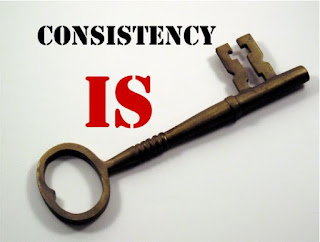 Good leaders do things well. Great leaders teach and inspire others to do things well. If you teach a man to fish, you feed him for a lifetime, right? The same concept applies to leadership: Successful leadership must contain equal amounts doing and holding others accountable.
Good leaders do things well. Great leaders teach and inspire others to do things well. If you teach a man to fish, you feed him for a lifetime, right? The same concept applies to leadership: Successful leadership must contain equal amounts doing and holding others accountable.
The best-performing companies have leaders that do and teach, who instill confidence in their team and share their vision with others. These CEOs and executives manage at a macro-level, holding their teams and employees accountable while providing guidance and coaching to help them solve problems on their own.
So what characteristics do great leaders all possess? They…
1. Face the facts, no matter how brutal they may be.
 Bad news is part of business. Great leaders don’t just wait for it, they seek it out. Rather than waiting until a task or project is completed, they look for red flags and identify when it’s off-track to reach the stated objective. And they don’t kill the messenger—when an employee points out underperforming or failing projects, these leaders appreciate the fact that it was brought to their attention. Identifying the problems earlier gives them extra time to find solutions and solve problems faster than their competition.
Bad news is part of business. Great leaders don’t just wait for it, they seek it out. Rather than waiting until a task or project is completed, they look for red flags and identify when it’s off-track to reach the stated objective. And they don’t kill the messenger—when an employee points out underperforming or failing projects, these leaders appreciate the fact that it was brought to their attention. Identifying the problems earlier gives them extra time to find solutions and solve problems faster than their competition.
2. Take accountability seriously.
Executives want to get regular updates on all projects, whether it’s during weekly meetings or through software that facilitates strategy execution. They hold people accountable to do what they should be doing and completing the tasks on their plate. If goals aren’t being met, great leaders take the opportunity to discuss, gather insight, and make the adjustments necessary for the individual employees and the company to win.
3. Look for bright spots.
Great leaders actively look for not just good news, but victories that can be replicated across other departments and teams. It’s their job to observe and identify how these victories happened so the same strategies can be implemented elsewhere in the company for even greater success.
4. Develop and prioritize winning moves.
 Not every single good idea can be a great idea, one that will provide the best chance of achieving success. Implementing too many strategies can spread a team too thin and result in things falling through the cracks. Instead, great leaders focus on several key strategies, which they discuss and debate with their executive teams before deciding on which ones will bring the company closer to reaching its goals. Powerful winning moves will come from strategic thinking and decision-making, considering all the options and determining which ones will bring the biggest return—year over year, quarter over quarter.
Not every single good idea can be a great idea, one that will provide the best chance of achieving success. Implementing too many strategies can spread a team too thin and result in things falling through the cracks. Instead, great leaders focus on several key strategies, which they discuss and debate with their executive teams before deciding on which ones will bring the company closer to reaching its goals. Powerful winning moves will come from strategic thinking and decision-making, considering all the options and determining which ones will bring the biggest return—year over year, quarter over quarter.
5. Scrap what’s not working.
 When you have conceptualized a project, product or service from the beginning, nurtured it and worked hard to, well, make it work, it’s hard to pull the plug if it’s not working. Great leaders must be able to realize when something isn’t working, no matter how hard they’ve worked to make it succeed. If a new product is eating into the revenue stream, these leaders are able to take a step back and scrap it. If not, the competition will swoop in with a bigger and better product.
When you have conceptualized a project, product or service from the beginning, nurtured it and worked hard to, well, make it work, it’s hard to pull the plug if it’s not working. Great leaders must be able to realize when something isn’t working, no matter how hard they’ve worked to make it succeed. If a new product is eating into the revenue stream, these leaders are able to take a step back and scrap it. If not, the competition will swoop in with a bigger and better product.
6. Focus on the best and brightest.
It’s easy to get distracted by new ideas and strategies. But if a goal is big and bold enough, everyone will feel excited to work toward it. Rather than working on a bunch of smaller, less exciting ideas, a great leader will recognize the strategies that will motivate and inspire their teams to push toward success.
7. Plan successful quarters.
 Focusing on annual goals is great, but quarterly goals are the ones that get you there, and great leaders know that each week in a quarter is crucial. The best companies focus on having successful weeks so they can achieve the right results at the end of the quarter. Business is not a sprint, it’s a marathon. Each leg of the race (or quarter) supports the end goal—helping you reach the finish line in first place.
Focusing on annual goals is great, but quarterly goals are the ones that get you there, and great leaders know that each week in a quarter is crucial. The best companies focus on having successful weeks so they can achieve the right results at the end of the quarter. Business is not a sprint, it’s a marathon. Each leg of the race (or quarter) supports the end goal—helping you reach the finish line in first place.
8. Encourage consistency but not complacency.
 Getting into a rhythm can help business processes become as regular as breathing, but this doesn’t mean you should rest once you get there. When your business is predictable, growth stagnates and success can reach a limit. However, when a business is consistent, great leaders take that opportunity to focus on what’s needed to take it to the next level. This discipline of consistency helps executives think outside the box and evaluate what new strategies and calculated risks can help grow the business and achieve greater success.
Getting into a rhythm can help business processes become as regular as breathing, but this doesn’t mean you should rest once you get there. When your business is predictable, growth stagnates and success can reach a limit. However, when a business is consistent, great leaders take that opportunity to focus on what’s needed to take it to the next level. This discipline of consistency helps executives think outside the box and evaluate what new strategies and calculated risks can help grow the business and achieve greater success.
9. Lead adjustment meetings.
Knowing the status of where projects stand is something all leaders must do in order to keep their business moving forward. But “status meetings” lack any means of providing solutions for problems that might have only just started to arise. Instead, great executives focus on leading adjustment meetings where the team can discuss plans that are already or about to get off-track and provide solutions and ideas for improvement.
Companies that are performing well and in the top tier of their industries all have one thing in common—great leadership. CEOs and executives who not only do things right but also inspire those around them to perform at their best can achieve consistent and remarkable growth, quarter after quarter, year after year.
Edited and Posted from : Success.com
Thanks & Regards,
S.Grace Paul Regan





